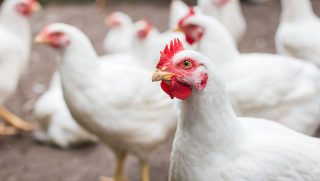Rhonda was a beautiful, vibrant California dairy girl. She was the first friend I made there when I moved across the country from Michigan for my first job. I remember the beauty of her wedding day, but the darkness of her funeral stands out more. Rhonda died by suicide in her 20s. The pain of her death is one of the big reasons I speak about mental wellness in agriculture, and her picture remains in my office today.
September is suicide prevention month. It’s a topic that none of us in agriculture want to talk about, but we need to. In 2022, U.S. deaths by suicide increased by 2.6 percent — and are 2/3 higher in rural areas. Even scarier, rural youth have suicide rates double that of urban youth. While we may not want to discuss suicide, data shows it’s a topic that’s too important to keep ignoring. Every time I speak to an audience about managing stress, people tell me how they know farmers or veterinarians who died by suicide.
I believe one of the keys to preventing suicide is to better manage stress, which has overtaken weight as the top health condition being explored in the U.S. Agriculture is filled with chronic stressors like high input prices, global trade concerns, isolation, profit margins, crop/animal disease, weather, loans — not to mention working with family, fear of losing the farm, being questioned by consumers, protecting our independence, dealing with employees, and the culture of “pull yourself up by your bootstraps.”
The concerns around how this is impacting our business have led to stress and suicide being included in National Farm Safety and Health Week (NFSHW), themed “No one can take your place.” The Agrisafe Network is offering a variety of farm safety and health free webinars, including the “Protecting Your Brain from Stress” I donated. If you register here, you’ll receive a link to the complimentary recording. I’ve also created a special package for Agriculture’s Growth Journal for the month — buy three journals to help you manage stress and you’ll get three free.
Agriculture’s Growth Journal
This Growth Journal gives you space to capture your thoughts, record your data, AND brings 50+ tips to manage stress.
• Click here for a fall season special of buy three, get three free.
Science shows that the results of stress are predictable. Stress sets off a series of chemical reactions that are designed to prepare us to engage with or run away from the stressor. Adrenaline is released to prepare the muscle for exertion, and cortisol to regulate bodily functions. This results in increased blood pressure, faster heart rate, slowed or stopped digestive system, and blood clotting more quickly.
It is key for our well-being is finding ways to lessen the cortisol load, which I’ve written about in previous AGDAILY columns. It’s important to understand that your brain is going to respond to stress with chemical reactions, whether you like it or not.
Long-term, chronic stress is a known risk factor in many leading causes of premature death in adults. The Mayo Clinic shows that ongoing stress increases the risk of heart disease, stroke, hypertension, diabetes, and deterioration of the immune. A constant cortisol release can shrink your brain — and is a risk-factor for depression, addiction, and suicide.
Some of symptoms to look for include social withdrawal, daily use of drugs/alcohol, agitated body language, change in sleeping patterns, racing heart, headaches, not eating, loneliness, always being tired, change in farm or vet clinic appearance, and constant overwhelm.
Weighing the risk factors against protective factors can help. I recommend a SMART approach to increase protective factors to help you manage stress — and its impact on your brain.
- Sleep: It’s essential for rational decision-making. Go to a doctor if you’re not sleeping well for more than two weeks.
- Move: Exercise reduces cortisol – take 20 minutes to get your blood moving 3x/week.
- Ask Your Food: Nutrition directly influences emotions and the brain. Feed your mental health!
- Rest: Take a break. Distance provides perspective.
- Train Your Brain: Avoid negativity bias. Think positive and laugh 15x daily for health maintenance.
How can you help someone cope with stress? Knowing some of the signs is the first step and working through the SMART approach yourself can increase your understanding. Demonstrating how to accept help can also go a long way; agriculture is filled with independent people who like to just fix things themselves. If you’re more open about the struggles you face may be the catalyst for others to realize they’re not alone.
Providing an opportunity to take a break can help a lot. This provides perspective, and a lens that is much wider than being in the thick of the farm, ranch, or veterinary practice all day, every day. Inviting others to activities does two things — gets both of you away and grows social support. Just three social ties can lower your chances of early death by 200 percent.

“What if I offend them?” is one of the most common questions I hear when speaking to groups about mental wellness. Yes, it is hard to have a conversation with someone about their mental health. It’s more important to say something if you see something. If you are not close enough to a person, find a spouse, faith leader, friend, medical professional, or loved one to alert them of your concerns.
And if you are in a situation with someone who you’re concerned will hurt themselves, such as an employee, family member, or neighbor? Know that you will not plant the idea of suicide. Katie Downs from Cornell’s New Yor Farm Net says “If you think they may harm themselves, ask them, ‘Are you going to complete suicide? Are you going to harm yourself?’ Ask them directly because they may be totally relieved that someone else sees how stressed out they are.”
When it comes to suicide and stress levels, it’s always better to have the tough conversations. If you see something, say something. Please! I know that firsthand from losing my friend, Rhonda. I wished I knew then what I know now. Let’s all remember that agriculture is a people business — and better care for our fellow humans.
Michele Payn helps the people of agriculture have the tough conversations about managing stress, connecting with consumers, and making sense of science through her speaking and writing. Learn more at causematters.com or follow @mpaynspeaker on social media.



